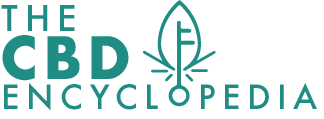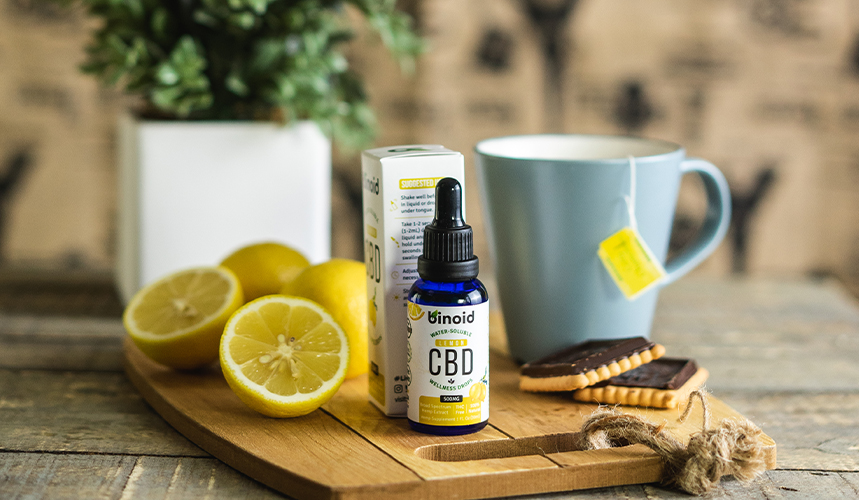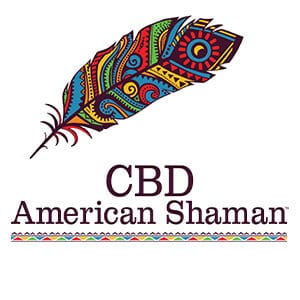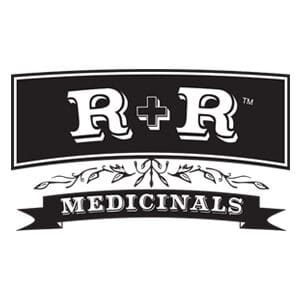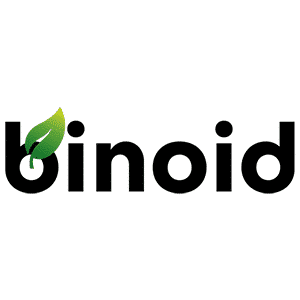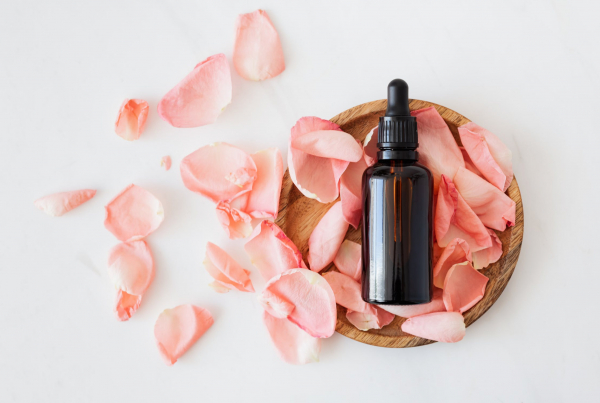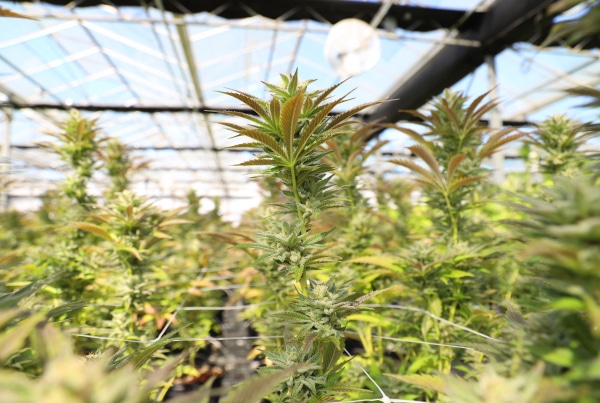
Medical Disclaimer: This content is not intended to be a substitute for professional medical advice, diagnosis, or treatment. Always seek the advice of your physician or another qualified health provider with any questions you may have regarding a medical condition.
The CBD Encyclopedia is dedicated to transparency and accountability in everything we do. We hope to provide you accurate, unbiased, and trusted information on cannabis. We hope our work helps inspire companies in the cannabis industry to make a similar commitment to accountability. Thank you for being a part of the movement!
How Cannabis Works: The Endocannabinoid System
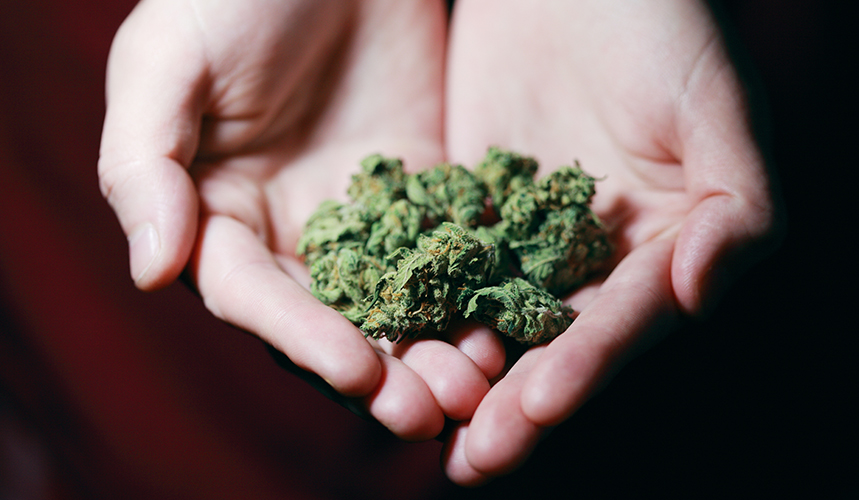
What really happens when you use cannabis? Many are privy to its profound effects on the human body, but few understand its method of action. The chemical compounds in cannabis affect the endocannabinoid (EC) system, a central component of the health and healing of every human and almost every animal. Scientists estimate that the EC system evolved in primitive animals over 600 million years ago.
The endocannabinoids and their receptors are found in the brain, organs, connective tissue, glands and immune cells—all throughout the body. The system is responsible for managing a vast range of physiological processes including mood, memory, pain-sensation, appetite, and regulating the psychoactive effects of cannabis.
The EC system is a physiological system essential in establishing and maintaining human health.
First, a little biology background. The EC system receptors were originally discovered as being sensitive to THC. Researchers have identified two cannabinoid receptors that comprise the EC system: CB1 and CB2. CB1 receptors are primarily found in the nervous system, connective tissues, gonads, glands, and organs; while CB2 receptors are primarily found in the immune system and other periphery structures. Note that some tissues may contain both receptors, each responsible for a different action. Scientists suspect there is another receptor that has yet to be discovered.
Your body naturally creates endocannabinoids to stimulate these receptors. There are six known endocannabinoids produced naturally by the body; however, your EC system can also be stimulated by phytocannabinoids (plant-based cannabinoids) produced by the cannabis plant. They ‘look like’ their endogenous counterparts on a molecular level and therefore fit perfectly into your body’s receptors. THC’s analogous endogenous compound is a neurotransmitter called anandamide, also known as the ‘bliss molecule.’ The discovery of anandamide came from research into CB1 and CB2, as it was inevitable that our bodies produce a chemical internally that affects the EC receptors.
Scientists have discovered more than 85 different phytocannabinoids, typically referred to as just cannabinoids, found in various cannabis trichomes. Some are psychoactive while others are non-psychoactive. In essence, the cannabinoids found in cannabis can be thought of as nature’s supplement for stimulating the EC system. Another good example of an endogenous/exogenous pair of compounds is morphine and enkephalin.
Before you smoke, anandamide and dopamine are managing your fine motor skills, appetite, mood, and cognitive abilities in the brain. As soon as you take a hit, various phytocannabinoids slide into your CB1 and CB2 receptors like a key into a lock. Next thing you know, anandamide can’t bind to those sites anymore (as they are occupied by THC and other cannabinoids) and you begin to feel euphoric, spacey, and ready for snacks. While these are some of the stereotypical effects of THC, the specifics will vary from strain to strain based on its cannabinoid composition.
Regardless of your stance on the plant, one simple truth exists; a functional EC system is essential for health. Does this mean you need to consume cannabis to be healthy? No, your body is already producing endocannabinoids on its own. But you do need to have a properly functioning EC system to maintain health, which many people supplement with cannabis.
Research has shown that small doses of cannabinoids derived from cannabis can signal the body to increase endocannabinoid production and build additional cannabinoid receptors. This may explain why some first-time users don’t ‘get high’ their first time, but have a better response on the second or third try. Each portion of the EC system performs a slightly different task; however, the goal is always the same–homeostasis. Homeostasis is the tendency toward a relatively stable internal environment despite variations in the external environment. Essentially, the EC system is a physiological system involved in establishing and maintaining human health.
While the thought of smoking medicine may be alarming to modern physicians, scientific inquiry and patient testimony indicate that the primary cannabinoids found in cannabis actually work synergistically to produce superior medical effects with fewer side effects than isolated synthetic cannabinoids. Furthermore, there are a variety of other ways to medicate with cannabis that doesn’t cause respiratory irritation.
- Everyone has an endocannabinoid system; it evolved over 600 million years ago
- A functional endocannabinoid system is essential for health
- The compounds in cannabis mimic the natural chemicals your body produces
- The medical benefits of plant-derived cannabinoids vastly exceed the capabilities of isolated synthetics
The Health Benefits Of Cannabis Compounds
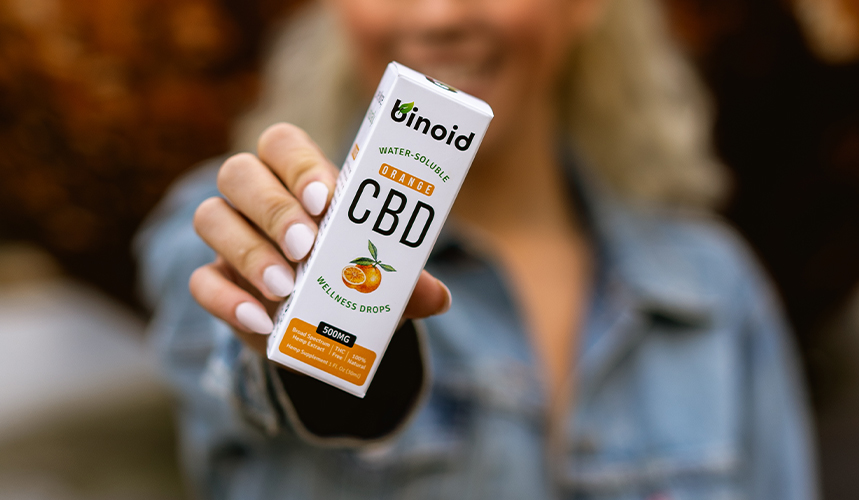
From insomnia to nausea, cannabis can be used as a natural remedy for a multitude of ailments. There are a few primary cannabinoids which provide most of the effects associated with the cannabis plant–THC, THCa, CBD, CBN, CBG, and CBC. Cannabinoids are a class of diverse chemical compounds that act on cannabinoid receptors in cells that repress neurotransmitter release in the brain.
With the exception of THC, the other aforementioned cannabinoids are non-psychoactive–providing relief without the mental haziness. Specific cannabinoids can only be accessed during various windows of the plant’s life cycle, so if you have specific needs that relate to a given cannabinoid, you need to take note of the time period at which you’ll reap the greatest return on your investment. You can also take advantage of different compounds through different consumption methods.
Note: CBGa is the acidic, raw form of CBG, therefore it’s the genesis of the parent compound.
The Mother: CBG
Cannabigerol is considered to be the ‘mother’ of the other cannabinoids–enzymes can change it into THC, CBD or CBC (from their acidic forms first). CBG is generally considered to be non-psychoactive.
According to Steep Hill Labs, studies show CBG stimulates the growth of new brain cells (neurogenesis), including in the elderly. Because neurogenic compounds are exceptionally rare, CBG continues to be heavily researched.
CBG has antibacterial, antifungal, and anti-proliferative properties. Additionally, CBG stimulates bone growth. CBG continues to be studied for treatment of Glaucoma, Inflammatory Bowel Disease (IBD), insomnia, depression, and epilepsy/MS/Dravet syndrome. The beneficial compound is derived from high-CBG strain whole plant extractions.
Psychoactive Compounds
THC
Tetrahydrocannabinol, or THC for short, is the primary chemical responsible for most of the psychoactive effects associated with cannabis. THC, along with over 85 other cannabinoids, is found in the trichomes of the cannabis plant. The effects of THC are induced rapidly as the chemical binds to endocannabinoid receptors in the brain, central nervous system and the immune system. In addition to its psychoactive effects, cannabis provides a variety of physical health benefits. THC can be used to treat certain ailments, cancers, and diseases. THC aids in treating:
- ADD/ADHD – Increases the availability of dopamine, the mental slowdown = concentration
- Alzheimer’s – Slows the progression of the disease, blocks the enzyme that creates amyloid plaques
- Anorexia – Increases appetite
- Arthritis – Anti-inflammatory
- Asthma – Can help calm asthma attacks (although no inhalers exist yet)
- Cancer – Inhibits cell growth
- Crohns/Ulcerative colitis/IBS – Prevents intestinal permeability, reduces the flow of bacteria
- Concussion – Lessens bruising of the brain
- Dependency & Withdrawal – Combats withdrawal from dependency on benzodiazepines, opiates, and alcohol
- Epilepsy/MS/Seizures – Suppresses muscle spasms
- Glaucoma – Relieves eye pressure
- Hepatitis C – Aids with treatment symptoms like fatigue, nausea, muscle aches, loss of appetite, and depression
- HIV/AIDS – Aids with treatment symptoms like nausea, loss of appetite, and pain
- Parkinsons – Reduces pain & tremors, aids in sleep
- PTSD – Alleviates PTSD-related symptoms such as flashbacks, agitation, and nightmares
- Stroke – Protects the brain from damage by reducing the size of the affected area
- Tumors – Inhibits cell growth
Non-Psychoactive Compounds
THCa
Tetrahydrocannabinolic acid, or THCa for short, is found in raw and live/fresh cannabis but is progressively decarboxylated to THC with drying and heating (like when smoked, vaporized, or cooked). THCa is the most abundant cannabinoid in the vast majority of freshly harvested, high-THC cannabis strains grown in the U.S. Because the conversion from THCa to THC begins immediately after harvest, there are fewer methods of application/ingestion. The popular methods include juicing raw, fresh cannabis and THCa transdermal patches.
Given that THCa is non-psychoactive, it can be metabolized in much larger doses than THC, making it an attractive option for medical users. Preliminary studies suggest THCa has strong anti-inflammatory properties and is especially helpful in managing the severe pain caused by inflammation in Lupus and arthritis patients. Other medical benefits of THCa include neuroprotective, antiemetic (anti-vomiting), and anti-proliferative properties.
CBD
Cannabidiol, or CBD, is another non-psychoactive cannabinoid with a wide scope of medical applications. Of the 85 known cannabinoids, CBD and THC are usually present in the highest concentrations and are therefore the most widely studied. The medicinal properties of CBD are strong even in small doses.
The ratios of THC and CBD vary among strains and crops; as a general rule of thumb, cannabis plants grown for recreational purposes are grown for high levels of THC, whereas high-CBD plants are grown for medical benefits and retain CBD to THC ratios ranging from 1:1 to 25:1 (Valentine X strain–known as ‘patron saint of epilepsy’). The right ratio for you depends on the relief you seek and your specific endocannabinoid system. For reference, industrial hemp plants contain primarily CBD with very low THC percentages, typically under 0.3 percent.
The combination of medical efficacy without the accompanying psychoactivity associated with THC makes CBD ideal for treating children, the elderly, and those who want to remain clear-headed. In fact, several studies suggest that CBD actually counters the ‘high’ caused by THC. CBD can help moderate some of the negative effects of THC (paranoia, accelerated heartbeat, and short-term memory loss) while bolstering its medical benefits. CBD’s antipsychotic properties are currently being studied as an alternative treatment for schizophrenia, psychosis, and anxiety.
One of CBD’s most proven medical applications has been in the treatment of epilepsy/MS/Dravet syndrome. Animal research has suggested that CBD can act as an anti-convulsant without further exacerbating seizures. Anecdotal evidence has shown CBD to have the same strong anti-epileptic effects in humans.
The most common treatment method for those suffering from extreme seizures is ingesting high-CBD cannabis oil concentrate in capsules. Because cannabis remains largely illegal and unregulated, it is difficult to recommend dosages and many utilizing medical cannabis are forced to conduct home trials–starting with low dosages, five milligrams is usually a good place to start and increasing until the desired results are achieved.
Although more clinical research needs to be conducted, CBD as a natural, alternative treatment is extremely safe (overdose is impossible) and there are a myriad of medical benefits associated with CBD.
CBN
Cannabinol (CBN) is created over time when THC is exposed to oxygen and UV light/heat. Because CBN is the byproduct of prolonged exposure to air, it is not usually found in high concentrations in properly stored cannabis. For those seeking more CBN, leave your cannabis exposed in a cool (+/-70 degree Fahrenheit) environment for a prolonged period–the THC will degrade to CBN. CBN is a very weak psychoactive cannabinoid–significantly less intense than when it was THC. In general, Indica strains are found to have higher concentrations of CBN than Sativa strains.
From a medical perspective, CBN is considered to be the strongest sedative of the known cannabinoids. Its sedative effects are so powerful that cannabis with concentrations of CBN approaching one percent by weight can be useful in treating insomnia. According to Steep Hill Labs, two-and-a-half to five milligrams of CBN is as effective as a five to ten-milligram dose of diazepam. For sleep inducement, CBN is synergistic with CBD and THC in the correct ratios.
Studies show that CBN reduces the intraocular pressure associated with Glaucoma, making it a viable alternative for those seeking relief without the psychoactive effects of THC. CBN also offers pain relief for those who want to remain clear-headed. The most common concentrated CBN applications include transdermal patches, topical gels, and oral capsules. Cannabis flowers and concentrates with high (one percent) concentrations of CBN can also be smoked or vaporized. See the chart below for a full list of the medical benefits associated with CBN.
CBC
Cannabichromene (CBC) is another non-psychoactive cannabinoid found in trace amounts in cannabis. CBC has not been studied to the same degree as other more prevalent cannabinoids. CBC has the same chemical formula and weight as THC and CBD but differs in the arrangement of its atoms.
According to Steep Hill Labs, CBC has been shown to be about ten times more effective than CBD in treating anxiety and stress. Preliminary studies suggest that CBC has analgesic, anti-inflammatory, anti-proliferative, antifungal, and antiviral properties. In addition, CBC promotes bone growth. CBC is effective on its own and in conjunction with other cannabinoids. For a full list of the medical benefits associated with CBC, see the chart below.
Which Cannabis Compound Is Right For Me?
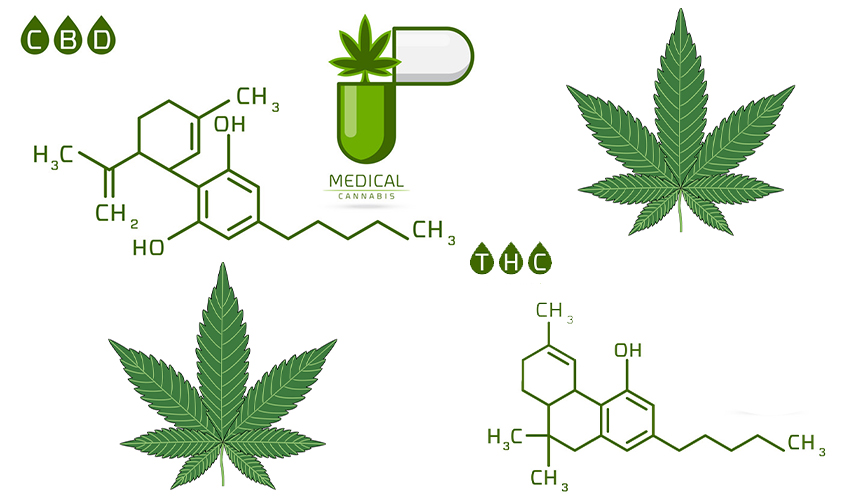
This depends largely on the effects you seek. Remember, THC is the only cannabinoid that will get you ‘high’–all the others will provide relief without the psychoactivity. Many of these compounds work in a synergistic fashion, so feel free to try combining them via various consumption methods.
CBD vs THC: How to choose
The answer to this question is simple: it depends! You may even find you like both. If you are trying to decide between the two—you can also try both—here are some questions to ask yourself to help weigh the pros and cons:
CBD:
- Do you want a calming effect with fewer side effects and sensations?
- Do you need to remain mentally clear?
- Can you commit to taking a regular dose daily?
- Do you want something that does little to alter your daily routine?
- Have you ever used CBD before? How did it make you feel?
- Do you understand the legal status of hemp and CBD products in your state?
THC:
- Do you want a stronger sensation with a wider range of benefits and effects?
- Will you be OK with feeling mentally hazy?
- Are you worried about the possibility of THC-related paranoia?
- Have you ever used THC before? How did you respond to it?
- Do you understand the legal status of THC in your state?
- Would you be willing to go to dispensaries to get it?
- Would you be willing to get a medical prescription, if necessary?
- Will you need to drive or operate machinery?
- Are you worried about hunger or weight gain?
Full-Spectrum Vs. Broad-Spectrum Vs. Isolate CBD
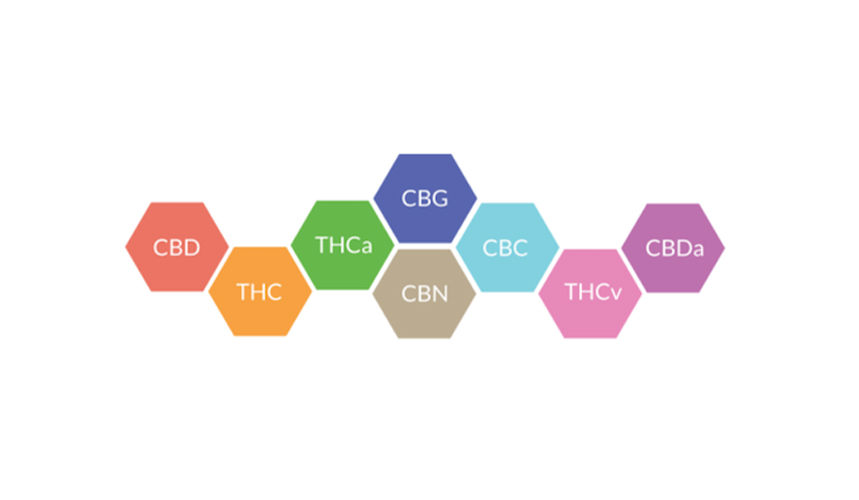
There are three main types of CBD products that brands are currently manufacturing: full-spectrum, broad-spectrum, and isolate. It’s an important concept to understand, because even though it’s CBD, one of these three products might be a problem for you if you are drug tested for work.
Full-spectrum CBD
If a CBD product is labeled “full-spectrum”, it contains a complete range of all the phytochemicals that occur naturally in the plant. This includes THC, CBD, other trace cannabinoids, terpenes, and oil from the plant. It is important to note that full-spectrum extracts derived from hemp generally come with a negligible THC content.
The ‘entourage effect’ is a beneficial phenomenon that occurs when using a full-spectrum CBD product. The active compounds extracted from the hemp are synergistic, amplifying the health benefits of each individual cannabinoid on the body.
Note: Even though the THC concentration is very low (usually below 0.3 percent), full-spectrum CBD could give you a false positive during a drug test, especially if you consume high doses of CBD oil daily. Broad-spectrum CBD products are a better choice if you are concerned about a false positive on a drug test.
Broad-spectrum CBD
Broad-spectrum CBD contains cannabidiol and all the other compounds within the plant, save for THC, which is completely removed after the initial extraction.
There is also an entourage effect with broad-spectrum CBD because you’re getting CBG, CBN, and other cannabinoids—just no THC.
CBD Oil
CBD isolate is the purest form of CBD, made by isolating the CBD cannabinoid compound made by removing it from all other ingredients. Usually produced in a powder, most Isolates are 99-percent pure. The purpose of using an isolate could be to have a higher concentration of CBD per serving, but a CBD isolate will not create an entourage effect.
For more information about the differences between Full-spectrum, Broad-spectrum, and Isolate CBD, visit our in-depth guide here.
Is CBD Safe?
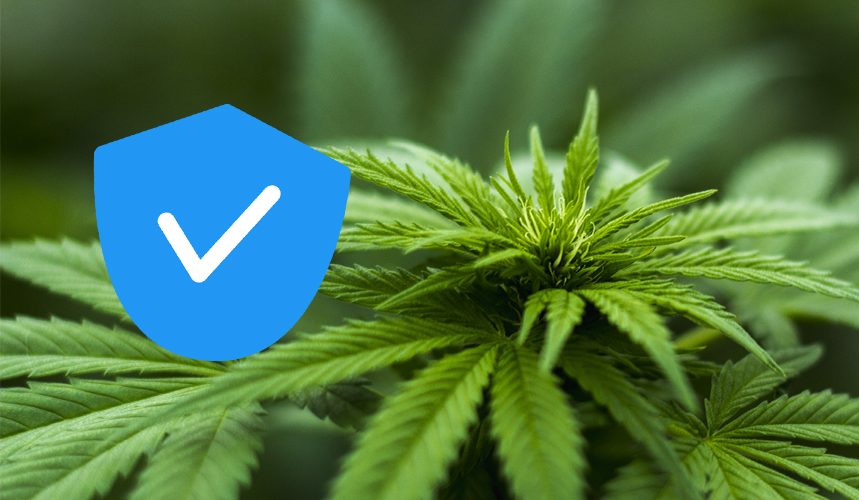
If an organic, plant-based medicine provided more lasting relief than pharmaceuticals, most people would make the switch in a heartbeat. The biggest question is whether CBD oil is actually safe. Assuming the starting material is a quality product, CBD is completely safe and is considered to be non-toxic. Studies also concluded that daily doses of CBD (700 mg) for six weeks did not induce any toxicity in patients. Meaning long-term daily consumption of CBD is also safe.
A 2001 NCBI study concluded that CBD “does not induce changes on food intake, does not induce catalepsy, does not affect physiological parameters (heart rate, blood pressure and body temperature), does not affect gastrointestinal transit and does not alter psychomotor or psychological functions.
Basically, CBD does not have the same psychoactive properties that THC does.
Then why the horror stories about patients becoming ill from ingesting CBD oil? The short answer–the products were made with toxic hemp. Remember CBD is extracted from the hemp plant if those plants were grown with toxic pesticides in soil containing heavy metals, your CBD extract will contain those same nasty chemicals and metals.
This is by far the biggest risk factor to consider when purchasing CBD–was the hemp starting material grown organically without the use of fertilizers or pesticides? If the answer is no, you are jeopardizing your health. There is no government agency that regulates CBD sales, meaning it’s up to you as a customer to do your research. That’s where we—The CBD Encyclopedia—come in. We help consumers make educated CBD purchasing decisions with first-hand reviews of every product from every brand that we feature on our site to ensure you’re getting exactly what you need and nothing of what you don’t.
Why Is CBD So Effective?

Rather than binding to your cannabinoid receptors directly (like THC), CBD indirectly influences these receptors and helps your body naturally produce more endocannabinoids on its own.
Because of its holistic impact on the overall state of the body, CBD is able to target the cause of the problem, rather than just the symptoms (like traditional pharmaceuticals do).
Regardless of your stance on hemp or CBD, a functional endocannabinoid system is essential for homeostasis and health. So does this mean you need to consume CBD every day to be healthy? No, not exactly.
For reference, endocannabinoids are produced naturally in the body, and phytocannabinoids—like THC and CBD—come from plants.
Your body produces endocannabinoids on its own. However, because you do need to have a properly functioning endocannabinoid system to maintain health, many people choose to supplement their endocannabinoids with phytocannabinoids like CBD—think of it as a daily multivitamin.
Homeostasis is Crucial for Optimal Health
Homeostasis means “the tendency of the body to seek and maintain a condition of balance or equilibrium within its internal environment, even when faced with external changes.” This is an extremely important physiological state that our body is constantly attempting to achieve.
Homeostasis keeps our physical environment under control and keeps the conditions conducive for cells to live and function optimally. Without the right physiological conditions, certain processes do not function properly, causing us to feel symptoms of disease and illness. The endocrine system plays an important role in homeostasis because hormones regulate the activity of body cells, but there are many other systems important to maintaining this equilibrium.
How Does CBD Help with Homeostasis?
The science suggests that CBD provides its pharmacological benefits primarily through its inhibition of fatty acid amide hydrolase, which may, in turn, increase the levels of endocannabinoids, such as anandamide (a feel-good compound analogous to the phytocannabinoid THC), produced by the body.
How Do You Know If CBD is Working? Can You Feel It?
The short answer is, it depends on which type of CBD you consume, and how much. For example, some CBD products like salves or sprays are only going to provide localized relief. Meaning, only the areas to which you apply the cream or spray the liquid will be affected. The topical application instantly reduces swelling, pain, and discomfort.
On the other hand, there are systemic CBD products that you can ingest that provide relief all over the body. When ingested, smoked, or vaporized, the onset of CBD is typically described as a relief or relaxation felt across the whole body. The objective is to provide relief without interfering with your ability to participate in day-to-day life.
Common Conditions CBD Helps Manage

The rise in popularity associated with CBD stemmed largely from its ability to treat chronic conditions, like the seizures associated with epilepsy & Multiple Sclerosis (MS). However, recent studies and anecdotal evidence show that CBD has the potential to improve the quality of life for nearly everyone–even if you’re healthy.
CBD has helped thousands of people suffering from anxiety and insomnia switch from pharmaceutical drugs like Ambien and Xanax to a natural, plant-based remedy. It’s important to note that one of the reasons CBD is so effective is because it helps treat the root cause of an issue as opposed to just the symptoms.
Research shows that CBD benefits include acting as an anti-inflammatory, anticonvulsant, anti-oxidant, anti-emetic, anxiolytic, and anti-psychotic agent, and is, therefore, a potential medicine for the treatment of neuroinflammation, epilepsy, oxidative injury, vomiting and nausea, anxiety, mood disorders, and schizophrenia.
In addition, cannabidiol lowers the incidence of diabetes, promotes heart health, may treat depression, and promotes bone growth. CBD certainly helps with insomnia and most people find it highly effective for sleep in particular, especially when combined with CBN (another non-psychoactive phytocannabinoid).
Here are some of the most common conditions that CBD helps manage:
Inflammation
Whether you realize it or not, inflammation is at the root of most diseases–Alzheimer’s, arthritis, Crohn’s disease, Eczema, Fibromyalgia, and even diabetes. The presence of inflammation is what allows these diseases to take hold in the body. Thus, one could argue that without inflammation, most diseases would not even exist.
CBD is an extremely powerful anti-inflammatory compound, which is why so many people with chronic conditions and compromised immune systems finally feel sustained relief after switching to CBD-oriented treatment regimens.
Pain
Given that so much pain (especially chronic) stems from inflammation, it should come as no surprise that CBD’s anti-inflammatory properties will inherently help with pain management. But it’s also worth noting that CBD is itself considered an analgesic–a class of drugs that are designed to relieve pain (think NSAIDs and narcotics).
After all, the body’s endocannabinoid system is involved in managing pain perception. This is why CBD is so effective at replacing opiates and Aspirin in the lives of those suffering from chronic pain.
Anxiety/Depression
For generalized anxiety, CBD has been shown to reduce stress levels in animals and humans.
Social Anxiety Disorder (SAD) is one of the most common anxiety conditions and it affects approximately 15 million American adults. NCBI performed a study on the impact of CBD on those suffering from SAD–participants were asked to give a public speech and the study concluded, “pre-treatment with CBD significantly reduced anxiety, cognitive impairment and discomfort in their speech performance.”
Read more about how to use CBD for mental health, here.
Insomnia
Insomnia is often related to stress, anxiety, and traumatic events. Thus it is easy to reason that CBD is equally as effective at treating anxiety-induced insomnia. The consumption of CBD often results in a ‘wave of relief’ that can be felt throughout the whole body.
Those who use CBD for insomnia and sleep report feelings of relaxation, calmness, and peace. Another related benefit to CBD is it can reduce symptoms related to PTSD.
What Kind Of CBD Product Works Best?
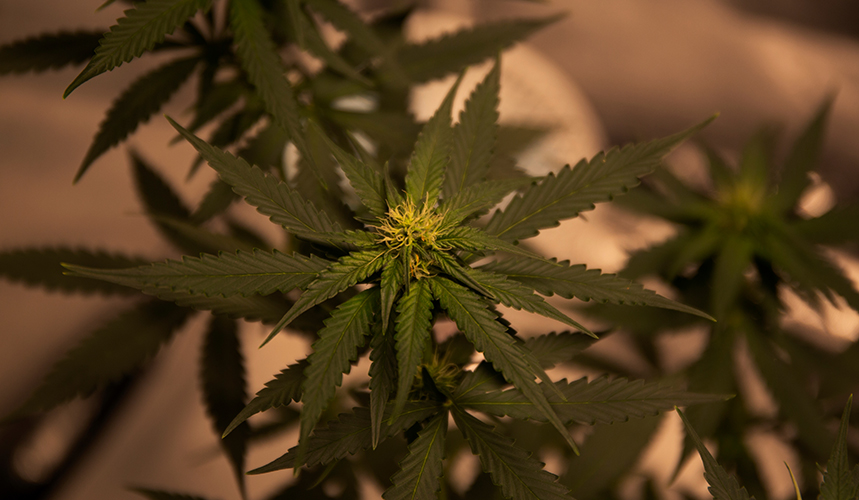
There are a variety of CBD products on the market today – each of which uses a different method of action to relieve symptoms. In addition to oil-based ingestibles like tinctures and gel caps, there are also CBD-rich topicals (salves, lotions, and sprays), bath products, lip balms, water, and smokeable. The best consumption method for you will depend on the results you seek.
CBD oil can be used in a variety of ways. For instance, It can be used in cooking. Two of the more popular ways of administering CBD oil are as a tincture or in vaporization. When used as a tincture, a few drops of CBD oil are placed under the tongue.
CBD oil is often sold in single-use cartridges for the purpose of vaporization. The cartridges are replaceable and sometimes refillable and are used via vape pens. Some people place a few drops of CBD oil in their e-juice, or vape juice, and ingest it that way.
When evaluating different consumption methods, the primary differences will be whether the product provides systemic or localized relief, the onset time, and the relief duration. Systemic relief affects the whole body, whereas localized relief only affects the area to which the product was applied. That said, many conditions benefit from a multi-pronged approach where you treat a problem with a mix of products.
You could combat rheumatoid arthritis, for instance, with a CBD oil to reduce systemic inflammation and a CBD topical cream to treat the local joints. The other benefit to this complimentary product approach is that some products provide instant relief for a short amount of time, while others have a longer onset time but provide relief for the entire day.
There are a variety of different ways to consume CBD. Our guidelines can help you determine what types of CBD products and dosing strategies will best suit your needs and alleviate your symptoms.
In addition, you should take a strong look at the supplier of the CBD you purchase. There are a lot of pitfalls and common mistakes people make when buying CBD which we address in detail on this website.
You may notice that many of the CBD products described use MCT coconut oil as a carrier for CBD extract. This is because coconut oil is high in medium-chain triglycerides (MCTs). This is important because unlike other types of fats, MCTs don’t need to be broken down before they’re used for energy, and they don’t require any extra energy to digest or absorb. This makes the use of coconut oil especially helpful as a carrier for those who suffer from impaired fat digestion and gallbladder issues.
Systemic Products
These products are a great way to get your desired daily dose of CBD. Many people find that a regular, daily dose of CBD is great for prevention and management. Alternatively, a larger dose can be used to treat flare ups. The following products provide systemic relief for several hours – they are especially helpful for those suffering from anxiety, depression, and immune system issues.
Oil Tinctures
A tincture is a liquid CBD concentrate that is applied under the tongue. Historically, tinctures were alcohol-based; however, we recommend a coconut/MCT oil-based tincture that allows the CBD oil to be easily absorbed by the body. The solution is absorbed by the arterial blood supply under the tongue within seconds, but the full extent of the effects can take up to an hour to be felt.
Holding the liquid under the tongue allows for faster absorption through the bloodstream as opposed to processing through the gastrointestinal (GI) tract. Tinctures and gel caps provide the longest duration of relief—anywhere from four to over eight hours, depending on the individual.
Gelcaps
Gelcaps contain a CBD extract in an organic MCT coconut oil carrier. They are a form of ingestible CBD–very similar to tinctures–the primary difference is the form factor. Gelcaps provide sustained, systemic relief for several hours. The downside to gel caps is the hour-plus onset time–certainly the longest of any of the consumption options (because the CBD is not immediately absorbed under the tongue like a tincture).
Many people like the gel caps because it feels like they are taking a normal pill, which they are already comfortable doing. The gel caps and tinctures are generally interchangeable–just be mindful of the slight difference in onset time.
Isolate
CBD isolate is a form of 99percent pure CBD crystals that have been pulverized into a powder that is easily vaporized. The benefit to vaporizing CBD is that the effects can be felt instantaneously–isolate provides the fastest form of systemic relief. The effects of isolate can last from 90 minutes to over three hours, depending on the individual.
Vaping
If you’re a smoker of any kind, you’re probably familiar with vaping. A vaporizer uses much lower temperatures than those used when smoking to convert a liquid (oil-based) CBD extract into a vapor. This vapor is readily absorbed by the vascular tissue of the lungs, making vaporized CBD more fast-acting than CBD taken orally or sublingually.
This makes it a very attractive option for many people, especially those who choose not to (or may not be able to) smoke. However, there are a few things you should know when choosing CBD vapor products. Here, we’ll discuss what to expect from your CBD vaping experience.
CBD has no psychoactive effects of its own, but that doesn’t mean you won’t feel it working. One of the benefits of CBD vape oil is its fast-acting nature; since it’s absorbed by the tissue of your lungs, it goes to work quickly, so you’ll feel it working within a few puffs off your vape. It’s also completely safe: overdose is impossible.
If you’re unfamiliar with the effects of CBD, you may not know what to expect from your first vape session. First, know that you won’t feel hazy or out of sorts—CBD has no psychoactive effects so it won’t inhibit your ability to get work done or go about your day. You can expect to feel clear-headed, focused, and decidedly not impaired. Many describe the sensation of vaporizing CBD as a ‘wave of relief’ that can be felt throughout the body. Think about it like a natural, plant-derived and inhaled version of Advil.
There are a number of physical effects you can expect to feel when vaping CBD. First, CBD reduces pain and inflammation, treating chronic pain by providing long-lasting relief that addresses not just the symptom of pain (this is through CBD’s analgesic properties, which are similar to those of pharmaceutical painkillers, but without the impairment and risk of addiction), but also the underlying cause of that pain: inflammation.
Vaping CBD can also help keep chronic and acute anxiety at bay, as well as lessen the frequency and severity of events like panic attacks.
If you’re looking for a high-quality, Farm Bill-compliant CBD vape oil, make sure the ingredients list is short! CBD vape oil should contain a carrier oil, the CBD extract, and perhaps a flavor or two. That’s it. Steer clear of products containing propylene glycol or polyethylene glycol and make sure you’re getting a pure product.
We only review vape products from brands we trust and approve, so you can be assured any vape products on our vaping page are a solid choice.
Smoking
To be clear, the effects are typically pretty mild, but that’s the point–CBD targets the source of your problem while limiting symptoms–without interfering with day-to-day life or impairing consumers in any way. The impact is nearly immediate when smoking, much like vaping.
After smoking CBD you may feel:
- Relieved
- Calm
- Relaxed
- Reduction or elimination of pain, especially chronic pain
- Comfortable
- ‘Normal’
- ‘Better’
We realize that some of these positive feelings are hard to quantify, but that’s absolutely within the nature of CBD.
Localized CBD Products
As the name indicates, these products only affect the area where the product was applied–as such, this class of products is often referred to as simply ‘topicals.’ Some only impact the skin layer to which they are applied, while others penetrate into the muscle and joints underneath the skin.
Salves/Rubs
Salves are CBD-infused topical creams that are applied directly to the skin for localized relief of pain and inflammation, making them perfect for treating muscle, joint, and surface-oriented pain. The CBD goes to work immediately after rubbing the salve onto the affected area and relief can be felt in as little as 15 minutes. Salves provide relief for hours; simply re-apply as necessary. Salves are best for those suffering from general aches, pains, soreness, and any form of arthritis.
Sprays
Sprays are another form of CBD-infused topical that is sprayed directly to the skin–this application method is preferred by those suffering from painful skin conditions like eczema, and psoriasis. These sprays are gentle and don’t leave behind the same oily consistency some salves do–making them better suited for treating burns, rashes, and other skin irritation. Some sprays even act as beauty products to help reduce wrinkles and rejuvenate the skin.
Soaks
Soaks refer to CBD-infused bath products that induce a calming and soothing effect. Oftentimes they are infused with aromatic essential oils to make your bath even more enjoyable. Soaks are best for those looking to relax their body and sooth their skin. Buy organic, 100-percent certified quality bath products.
Our absolute favorites are the nano-CBD bath bombs from CBD Living, which come in various scents and are very pleasant.
CBD Dosage: How Much To Take
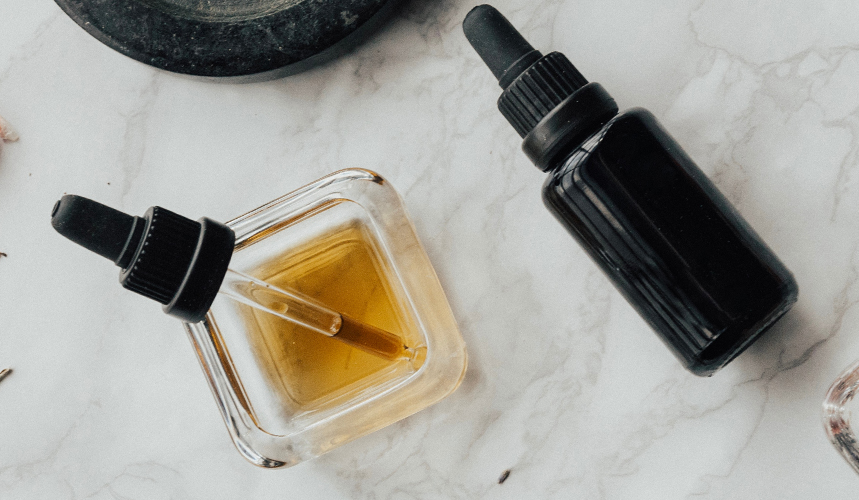
You may have heard about CBD and how it helps people manage pain, inflammation, nausea, and all these great things. But how do you know what to buy and how much to take if there are no doctors willing to sit down and create a custom regimen just for you? While it may seem daunting, when it comes to CBD, finding the correct dosage is a relatively simple process.
Our best advice is to start small and work your way up until you find the volume of CBD and mix of consumption methods that deliver the relief you desire. The benefit to this method is you can find your sweet spot without overdoing it, and then maintain a consistent daily dose. The best part about medicating with CBD is it’s impossible to overdose, which makes it a very safe process. Plus, CBD is not inherently addictive so there’s a very minimal risk of developing dependency issues.
How much CBD should I take?
For orally ingested products like tinctures and gel caps, we suggest starting with 15 mg per day of CBD and upping the dosage until relief is felt. These ingestible products provide sustained relief for several hours—many people find they provide relief for the whole day! The one thing to keep in mind with ingestible CBD products is the delayed onset time—it can take up to 90 minutes for the full effects of the tinctures or capsules to be felt.
One of our favorite tinctures is Joy Organics’ CBD Oil which comes in convenient 15 mg doses. You can read our review or buy it here. We especially like the Tranquil Mint flavor.
For CBD topical products like salves, sprays, and soaks, you can apply as liberally and frequently as needed— there’s no risk of overdoing it!
Can I Overdose on CBD?
You already have an endocannabinoid system whose sole purpose is to maintain equilibrium, or homeostasis, in your body. CBD nourishes this system. CBD is non-toxic and no fatal overdose levels have ever been reported.
Dosing Consistency
You’ll receive exponential benefits with a daily regimen as compared to sporadic or occasional usage.
Side Effects of CBD
CBD side effects are neither common nor serious.
- Drowsiness: Many people describe the effect of CBD as a ‘wave of relief’ or a ‘calming sensation.’ It’s worth noting that these feelings can manifest as drowsiness in high doses.
- Dry Mouth: Recently, scientists confirmed that there are in fact cannabinoid receptors in the salivary glands of humans. CBD interacts with these cannabinoid receptors and inhibits the secretion of saliva—which can cause ‘cotton mouth’.
- Low Blood Pressure: Very high doses of CBD can induce a slight drop in blood pressure that is often associated with mild lightheadedness.
- Lightheadedness: As described above, some consumers experience mild feelings of lightheadedness as a result of the slight drop in blood pressure.
- Inhibition of Hepatic Drug Metabolism: This one sounds worse than it is. If you’ve ever heard a physician caution eating a grapefruit with certain medications, this is the same effect.
We’d also like to note that there are conflicting studies regarding CBD’s potential side effects when treating Parkinson’s disease. Several studies suggest that CBD is safe and well-tolerated by Parkinson’s patients. However, other studies concluded that high doses of CBD led to increased tremors and muscle movement in Parkinson’s patients. The moral of the story? Start slow with low dosages and increase tolerance. You have a higher likelihood of finding relief than experiencing discomfort.
As you can see, that’s a short list of minor potential side effects—especially when compared to modern pharmaceuticals. This is why we believe so strongly in CBD’s ability to heal people – naturally! CBD has such a wide array of therapeutic applications with an astonishingly short list of side effects. If you’re ready to give CBD a try, we recommend buying from a trusted, reputable company.
Drug Interactions and CBD
CBD, like any other compound, has the potential to interact with your body’s processing of other substances. While it’s considered one of the safest substances you could possibly be taking, there’s one particular mechanism it affects that can potentially interact with a variety of substances. Keep in mind that interaction doesn’t mean catastrophic issue—this section isn’t meant to scare you, it’s meant to inform you of all possibilities, however remote. Talk to your doctor before making your decision if you’re worried about drug interactions.
CBD inhibits the activity of an enzyme called cytochrome P450, which is responsible for metabolizing many of the compounds you put in your body, including about 60 percent of the drugs you consume. When CBD slows down the activity of this enzyme, it takes it longer to do its job. This can raise the level of a drug in your system, as well as extend the length of time it takes your body to process it. Drugs that can be affected by CBD include:
- Anesthetics
- Antiarrhythmics
- Angiotensin II blockers
- Antibiotics
- Anti-epileptics
- Benzodiazepines
- Beta-blockers
- Calcium channel blockers
- HMG CoA reductase inhibitors
- HIV antivirals
- Immune modulators
- NSAID pain relievers
- Oral hypoglycemic agents
- PPIs
- Prokinetics
- Steroids
- Sulfonylureas
This isn’t meant to be an exhaustive list, but it should give you a good idea of what to look out for and to discuss with your doctor. When in doubt, it doesn’t hurt to ask!
Does CBD Show Up On A Drug Test?
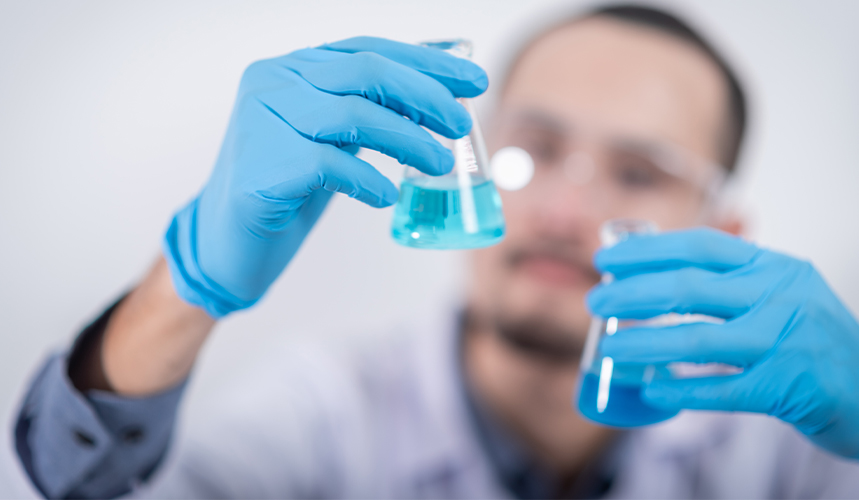
CBD is undoubtedly growing in popularity and is legal for purchase and possession in all fifty states. Many people choose to consume CBD for a variety of conditions, from chronic pain to depression to even cancer, and its use is only growing more widespread. While more studies are needed to determine the exact mechanisms by which CBD acts on the body, anecdotal reports from consumers are promising.
Since CBD is (usually) derived from the hemp plant (a distinct sub-classification of cannabis) and is a cannabinoid just like its psychoactive counterpart THC, it’s reasonable to wonder if it would cause you to fail a drug test. Here, we’ll discuss the science of modern drug testing and whether your dose of CBD could put you at risk for a false positive.
If drug testing is a part of the conditions of your employment, you might be concerned about the potential of CBD to cause you to test positive for THC. This isn’t a totally unfounded concern — however, there isn’t exactly a cut-and-dry way to answer it.
Much of the data we have about CBD is anecdotal, and its potential impact on drug testing is no exception. There are very few peer-reviewed studies on the subject, but there appears to be a small risk of a false positive for some users. Avoiding full-spectrum products containing traces of THC can reduce your risk of a false positive, but that may not eliminate the risk entirely.
Understanding the Science Behind Drug Tests: What They Look For
Drug tests are calibrated to search for specific chemical compounds, not a broad class of different but similar chemicals. For this reason, there is no drug test currently available that tests for cannabinoids at large, only specific compounds like THC and its main metabolite (or chemical byproduct), THC-COOH.
This is good news because it means drug testing companies have to be specific about the chemical compound they’re searching for. Since THC is the chemical that gives cannabis its psychoactive properties, it is the compound that’s tested for by modern drug screens.
Some tests, like mouth swabs, hair tests, and blood tests, look for THC itself, while others, like urinalysis, look for THC’s main metabolite, THC-COOH, which sticks around much longer than THC. However, there is currently not a test available that tests for CBD — or any other secondary cannabinoid.
Why, you ask? Well, it’s pretty straightforward: Since CBD is non-psychoactive, it won’t get you high no matter how much you smoke. Consequently, there’s very little interest in testing for it or, for that matter, legislating against it. It’s just not a thing (at this time, anyway — local laws are changing all the time, after all).
So, there is no drug test currently available that will yield a positive result from CBD alone. Sounds good, right? Mostly, but it’s not quite that simple for everyone: there are some things you should know before considering yourself fully in the clear.
We need to talk some specifics about where your CBD comes from, how it’s concentrated, and how your body metabolizes it, as well as some things to consider if you’re taking CBD at very high doses.
Marijuana- vs. Hemp-Derived CBD and Drug Testing
In order to know if your CBD product of choice will show up on a drug test, you need to know exactly where it comes from. Farm Bill-compliant CBD (the stuff that’s recently been made legal at the federal level) is made from industrial hemp, which is legally required to contain 0.3% THC or less. Keep this number in mind, as we’ll refer back to it later.
CBD that’s derived from hemp is completely legal under federal law because of its extremely low THC content, which makes it essentially impossible to abuse. The most commercially-available CBD is hemp-derived, but you should be sure to double-check with the manufacturer. Any reputable CBD provider should be very open about their source for their organic material—if they aren’t, it’s a big red flag and a definite sign to purchase your CBD elsewhere.
However, if you live in a state where cannabis is fully legal (lucky you!), you should watch out for CBD products derived from marijuana. Sometimes called Rick Simpson Oil, this form of CBD contains much higher levels of THC, giving it psychoactive effects and making it a liability if you’re subjected to a drug test.
While this type of extract can be beneficial to people suffering from serious illnesses like cancer or multiple sclerosis, its higher THC content (usually 6% or higher) means that it will show up on most drug tests, even if what you’re using contains more CBD than THC. THC has documented therapeutic benefits and healing applications, but unless you’re able to have it prescribed by a doctor (again, lucky you!), it does present a risk when attempting to pass a drug test.
Lack of Certainty with CBD & Drug Testing
So far, it looks fairly simple: hemp-derived CBD is – theoretically – undetectable on a drug test, while marijuana-derived CBD will yield a positive result and should be avoided by people who routinely undergo drug screens. For most of us, that sounds pretty straightforward.
However, it may not be quite that easy: there is evidence to suggest that, as full-spectrum hemp extracts, in particular, are concentrated, the trace amounts of THC they contain may become present at higher concentrations as well, which raises the risk of a false positive and makes the situation a bit murkier.
There is also a single study (though we have yet to see the findings replicated) that found that a proportion of orally ingested CBD (like softgels or gummies that are absorbed through the digestive tract) may be converted to THC by the digestive process.
While this is not a proven phenomenon (and researchers noted that there was no evidence to suggest that this occurs in vivo, suggesting that it may be an “in vitro artifact”), it’s absolutely worth mentioning, especially for consumers who prefer edibles over vaping or other CBD dosing methods. If the findings of this study make you uneasy, you might choose to stick to CBD dabs like these, or vaping, which bypass the digestive tract and sidestep this potential risk.
The bottom line here is this: There’s a lot we don’t yet know about how drug testing interacts with CBD and, while we strive to bring you the most complete and accurate information available, there is still an element of risk involved. Based on the information currently available to us, no CBD product is entirely without risk—in that way, it’s like many other things in life. Only you can assess those risks for yourself and decide if the benefits of CBD are worth those risks to you in your unique position.
THC Concentration: Unintended Consequences for Drug Testing
Earlier, we mentioned a potential problem with the concentration of CBD products causing higher levels of THC than presented on the label.
In some states where cannabis has been fully legalized, marijuana-derived CBD is available without a prescription. Often called Rick Simpson Oil (or RSO), marijuana-derived CBD is different from hemp-derived CBD in that its THC content is considerably higher, so it’s important to make sure that your CBD is derived from organically-grown hemp, not marijuana, in order to ensure you’re ingesting only trace amounts of THC.
CBD is not tested for by modern drug screens and, by itself, should not cause you to test positive for THC. The key there is by itself: if your CBD is made with high-THC marijuana instead of hemp, or is a highly concentrated product made with full-spectrum hemp extract, you could risk coming up positive. There’s also a (remote) possibility that a portion of orally ingested CBD products could be converted to THC in the digestive tract, though this is unconfirmed as of yet.
Let’s consider an example with a 500 mg bottle of CBD oil. Assuming the sample of industrial hemp flower used to make the tincture weighed 2.78 g (or 2778 mg), and assuming it was composed of 18-percent CBD and 0.3-percent THC (pretty standard percentages for hemp), the concentration of hemp extract needed to yield 500 mg of CBD would contain about 8.33 mg of THC. This is about 1.6-percent THC, much higher than the theoretical 0.3-percent of the starting material.
In this example, a 25 mg dose of our theoretical CBD oil would contain about 0.42 mg of THC. This may not be enough by itself to trigger a false positive, but if you’re using your oral dose of CBD in conjunction with other full-spectrum forms, such as vaping or dabbing, those trace amounts of THC may add up to become detectable in your system, causing you to risk failing a drug test.
For this reason, if you’re worried about passing a drug test, it’s best to look for options that are batch-tested by an independent laboratory and either display their THC content clearly in the analysis or are shown to contain no THC whatsoever. There are many CBD products available that are certified free of THC, and manufacturers are constantly seeking to make their formulas more accessible for all consumers, including those who are regularly drug tested.
Drug Tests and Taking CBD At Extreme Doses
For most of us, 15-50 mg of CBD daily is enough to treat a wide variety of symptoms and conditions, and that’s wonderful. However, it isn’t the case for everyone—for some patients struggling with aggressive illnesses like cancer, a much higher dose is required in order to be effective.
While it’s uncommon, a person taking 1,000 mg of CBD or more per day could, theoretically, test positive for THC on some drug screens. This is where that 0.3%-percent figure comes into play: a 1,000 mg dose of hemp-derived CBD contains approximately 3 mg of THC.
This amount wouldn’t be anywhere near what’s needed to feel any psychoactive effects, but it could be detected by drug tests with an exceptionally low threshold for THC, about 8-11% of tests. And, as we demonstrated earlier in our concentration example, full-spectrum extracts could theoretically contain 16 mg or more in a 1,000 mg dose, which would definitely cause you to fail a drug test.
You could opt for pure CBD isolate to either dab or mix with MCT oil to make your own tinctures if you’re concerned about this—you may miss out on the synergistic effects of other cannabinoids, but you’ll still get all the benefits of CBD with none of the risks of THC contamination.
There are also some manufacturers (Joy Organics comes to mind, but there are others) whose products include the beneficial cannabinoids and terpenes of full-spectrum extracts, but without any THC whatsoever. This type of product has been termed “broad-spectrum” and is growing in popularity.
We should note that 1,000 mg is a BIG dose: To put it in perspective, you’d need to take 40 (forty!) 25 mg CBD softgels (that’s one and a third bottles) or an entire bottle of 1,000 mg CBD tincture in a single day to reach this dose, and that dosage does not reflect the majority of CBD consumers. However, if you’re using CBD to aggressively treat an illness, you may need a dose this high, and that’s okay! That said, you may need to be cautious if you’re subject to drug testing. Just in case, we have multiple articles detailing how you can pass a drug test on short notice, even if you’re taking high doses of CBD or cannabis for health reasons.
CBD: Can You Really Take it Before Going To Work
CBD is growing in popularity, and for good reason: it provides many of the benefits of its psychoactive counterpart, THC, but without the high. This is good news for anyone looking to remain productive—after all, it’s hard for many people to get through a day at work when consuming traditional high-THC cannabis. CBD makes it possible to get the medical benefits of cannabis without the high, perfect for people who want to feel better while maintaining mental clarity.
What To Expect The First Time You Use CBD

First-time CBD users may look down at their watch 30 minutes after ingesting tinctures and stop to think, “I don’t feel anything, is it even working?” An hour later, they’ve totally forgotten about their anxiety, pain, inflammation (or any other symptom). You won’t feel anything out of the ordinary.
More than likely, you’ll eventually just realize that your pain has lessened, your anxiety has melted, or your depression has lifted. The effect, although subtle, is an extremely effective healing remedy that is difficult to disregard. People new to CBD often choose an oil for their first-time use.
What Does CBD Feel Like?

CBD targets the source of your problem while limiting symptoms—without interfering with day-to-day life. The sensation you get from consuming CBD in any of its forms is often described as a “wave of relief” or “relaxation” that can be felt throughout the entire body. A topical application can result in a nearly instant reduction in swelling, pain, and discomfort.
CBD Vs. THC
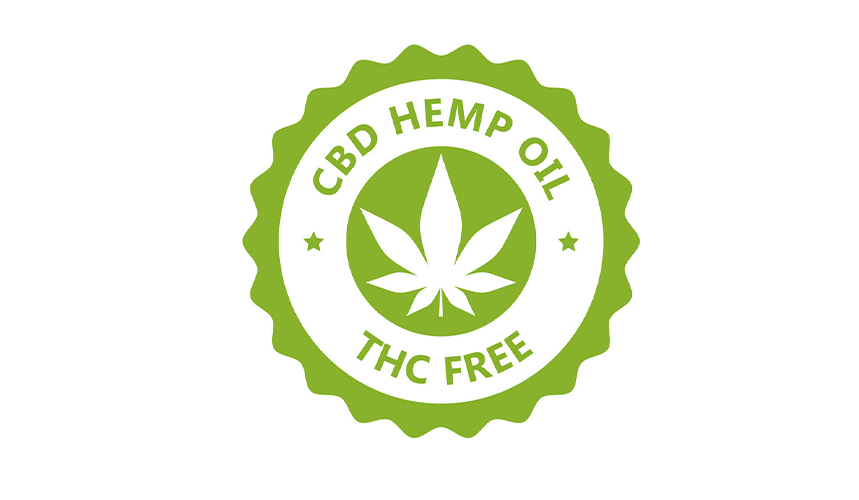
CBD and THC are incredibly powerful healing compounds derived from cannabis plants that are gaining massive amounts of attention as safer alternatives to dangerous pharmaceutical drugs.
Unfortunately, a lack of regulation has made it easy to find plenty of misinformation about their benefits and side effects. To combat this, we read over 100 different scientific studies about cannabis, CBD, and THC to sort out the facts from the myths.
The Chemical Differences Between THC and CBD
On a molecular level, these two compounds are very similar, but the small difference between them produces wildly different effects.
CB1 receptors deal primarily with mental and physical processes like memory, emotion, and motor skills. CB2 receptors affect the central and immune system. CBD and THC both work in tandem with these receptors and the result is a profound impact on symptoms such as pain, anxiety, depression, and dementia.
The different chemical structures in THC and CBD cause cannabinoid receptors to respond very differently when confronted with the two phytocannabinoids. On a basic level, this is why THC elicits a psychoactive brain response and CBD does not.
Legal Challenges with Cannabis
Cannabis in all of its forms is gaining legality in many states, but each state still has its own laws regarding how, where, and why residents can access THC and CBD products. They can get quite specific (and quite complicated) depending on the state you’re looking at.
One thing that is easy to say is that hemp-derived CBD is currently legal in all 50 states, but some states (like Idaho, for example) have very specific laws about who can access it in-state. In Idaho, only people with very specific conditions can get a prescription for it.
*Note: Anyone can legally purchase CBD online and have it shipped to any state. Still, it helps to look into your specific state CBD and hemp laws to understand what this could mean for you.
CBD products also can be derived from marijuana plants, but those products are much more heavily regulated due to the legal status around marijuana itself.
Hemp (which contains no more than 0.3 percent THC content as opposed to the up to 30 percent found in marijuana) is federally legal. Some states have their own laws regarding CBD products derived from marijuana. If you want to know exactly which products are in the clear for you, look into your state laws. Warning: they may be confusing.
If the products you want or need aren’t legal yet in your state, don’t lose hope. Hemp and marijuana laws are changing all the time. It is possible that federal legalization could happen even within the next decade. But in the meantime, do your best to understand where the laws stand in your state before you settle on a product.
Cannabis Products: A Note About Quality
THC and CBD, along with over 112+ other cannabinoids, are found primarily in something called the trichomes of the cannabis plant.
The trichomes of a cannabis plant are what make the flowers “sticky.”
Trichomes are tiny crystal-like stalks that cover the flowers and make them sticky. They hold all of the power to produce cannabinoids and terpenes. All of the recreational and medicinal value that’s derived from the cannabis plant is almost entirely dependent on the production and preservation of high-quality trichomes.
This is why the THC or CBD product you choose is so important. Not all products are created equal, and the quality of the product can significantly affect the healing properties you experience (as well as the negative side effects) while using it.
CBD Vs. Opioids
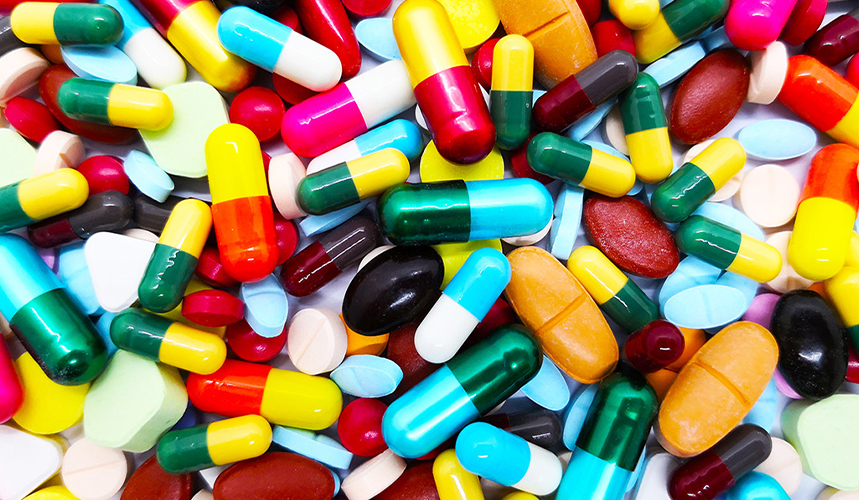
Opioid painkillers are among the most commonly prescribed drugs in America today, with millions of people taking them both for the acute pain following an injury and more chronic, long-term pain. The problem with this is, there isn’t evidence to definitively prove that opioids are effective against chronic pain, but there is abundant clinical evidence showing that long-term use of opioids can result in addiction and dependence, leading to unpleasant withdrawal symptoms if discontinued suddenly.
Opioids were responsible for almost 47,000 overdose deaths in 2018 alone, and even taking them as directed can cause overdose if combined with other opioids or with alcohol. They also produce significant impairment, which can keep you from your daily life.
With all the evidence of the harmful potential of opioid pain relievers, it’s easy to see why some patients are choosing to trade their pharmaceuticals for CBD.
Here, we’ll discuss the science behind the efficacy of CBD for chronic pain, why and how it works, and how it stacks up against the opioid competition. Before we begin, we should note that this article isn’t meant to be medical advice; talk to your doctor if you plan to discontinue your current medication, and make sure you do your research before making such a major decision.
Study: 50 Percent of People Say CBD Works Better
One of the most amazing things about the cannabis plant is the breadth of ailments it’s capable of alleviating. Patients who have used painkillers for years have started to take notice, and researchers were curious about the effectiveness of the switch. In an August study, market-research firm Brightfield Group surveyed 2,400 registered users of Hello MD and found that 42 percent of people who use CBD report that they’ve given up pharmaceutical drugs and replaced them with some form of cannabis.
We note that this figure includes all types of cannabis, ranging from high-THC medicinal marijuana with strong CBD content to CBD-only wellness products. Most importantly, 52 percent of respondents agreed that CBD is “more effective,” or “much more effective” than pharmaceutical drugs.
The important thing to realize is that while THC is the compound that provides the psychoactive properties, all THC strains will contain CBD to some degree (it’s the second-most prevalent cannabinoid after THC). The results are clear, those 52 percent of respondents were blown away by CBD’s pain management properties.
Conclusion: Opioids Or CBD?
While further study is needed (the more data, the stronger the results), the study results available today look promising: Multiple studies have shown CBD to be effective in treating a variety of types of pain, especially chronic and intractable pain. CBD has also been found to be effective in treating neuropathic pain resulting from multiple sclerosis.
This is exciting because, as anyone who suffers from neuropathy can tell you, the intense pain it causes is notoriously difficult to treat, and even heavy doses of opioids aren’t always effective.
CBD not only soothes difficult-to-treat pain in the short term, it’s also effective in the long term. In a study conducted in 2007, researchers found that patients were able to manage their pain (resulting from either MS or chronic nonmalignant pain) with cannabinoids without tolerance (requiring a higher and higher dose to be effective, common to opioids) over treatment programs lasting an average of two years.
For anyone who’s had to increase their opioid dose because they quickly develop a tolerance to it, this is big news! CBD allows patients to maintain the same dose for long periods of time, without the risk of addiction or dependence.
Recent studies have shed more and more light on the endocannabinoid system and its role in pain perception and inflammation. The body of literature confirming CBD as a viable and potentially more effective alternative to opioids is growing, especially as interest in CBD as a novel (new to scientific understanding) pain reliever continues to rise.
While studies have been conducted using both synthetic and plant-derived CBD, we believe that organically-grown, plant-derived, full-spectrum CBD is the way to go. After all, synthetic cannabinoids are still pharmaceuticals at the end of the day.
How To Get Off Opioids And Other Prescription Drugs With CBD

If you’ve decided to give CBD a try, you’ll need to know how to go about replacing your current medication regimen. We do not recommend quitting any pharmaceutical medication cold-turkey, as doing so can cause unpleasant withdrawal symptoms.
Fortunately, there is evidence that CBD can help counteract withdrawal symptoms, so you can use it to help you safely ease off your prescription dosage. Here, we’ll discuss how to go about safely getting off opioids completely and replace them with a CBD regimen to treat your pain.
Tapering Medications: What You Need to Know
If you’re trying to come off of a medication, you may find yourself short on resources and guidance. This is an unfortunate side effect of a for-profit medical system: Since helping people discontinue medications isn’t profitable, very few resources are put into studying safe and effective tapering schedules (PDF).
Many physicians know very little about how to create a plan for a patient to taper, and the information they have may not apply to your current situation or prescription. You’ll need to be an active participant in your care in order to successfully discontinue using opioids.
We’re certainly not saying your doctor doesn’t know their stuff—they’re part of your medical team and you need to communicate with them about your health, including your plan to discontinue your use of opioids. That said, you should be prepared to advocate for yourself and your health—more on that, below. Some patients find that the withdrawal symptoms they report are minimized or ignored altogether, and your doctor may suggest a tapering schedule that is too aggressive for you.
It is important that you communicate clearly and effectively with your doctor; if that is not possible, consider seeking another opinion. Medical help is immensely valuable, but don’t devalue your knowledge of your own body.
Incorporating CBD Into Your Health Regimen While Going Off Opioids
Before you start tapering off your medication, you’ll need to find the dose of CBD that works for you. Many people find a dose of 10-20 mg per day effective, but if you need more, take more! You won’t overdose or grow dependent and you won’t feel impaired, so you’re free to take as much as you need for relief from your symptoms.
We recommend using a systemic product, such as a CBD tincture or softgel, for daily dosing—save the vaping or dabbing for acute pain. If you’re unsure how much to take, start with five to 10 mg and wait 45 minutes. If you feel no change, take five milligrams more and wait another 30 minutes, repeating as necessary until you find the dose that works for you.
We recommend taking CBD about two hours before you take your regular medications during this time, that way you’ll be able to distinguish the effects of the CBD from your current prescription. Once you’ve established the dose that’s right for you, you’re ready to move on to phase two: Actually tapering off your opioid prescription.
Tapering Off Opioids with CBD: Be Patient!
Opioids are notorious for causing addiction and physical dependence, and weaning yourself off of them can take some time. That’s okay! It may be frustrating to continue to take them for longer than you’d probably like, but anyone who’s experienced withdrawal can tell you that going slow will save you a lot of grief.
It’s important to work with your doctor during this time: They can suggest a tapering schedule to start off with, as well as give you ideas if the original plan is too aggressive. Keep in mind you’ll have to hang out at the same dose for a little while after lowering it each time—don’t rush. We know you want to be off this medication as quickly as possible, but you also want to be gentle to your system and take this process as slow as you need to.
During this time, you’ll keep taking your CBD at the dose you found that works for you. Consistency is key with CBD, so make sure you’re consuming it every day. You can also choose to supplement your long-acting CBD (tinctures or softgels) with something that takes effect more quickly, such as vaping or dabbing. If you need more localized relief, consider using a topical CBD salve to soothe aching joints and muscles and reduce inflammation from both within and without.
We found FOCL’s Relief Cream to be highly effective and pleasant to use.
How to Switch Effectively From Opioids
Pace yourself, on both the decrease and the increase. The problem with switching from painkillers to medical marijuana or high-CBD medicine is that it’s easy to swap “one addiction for another.” We’re not saying cannabis is addictive (it’s not) but we are suggesting that it can be difficult to switch from the numbness delivered by the painkillers to that peacefulness provided by cannabis.
The goal is to be able to get off the couch and move beyond the non-functional opioid-induced state. It’s absolutely possible to operate normally on cannabis, and especially CBD-rich products because they do not get you ‘high’ in the traditional, psychoactive sense.
We always recommend starting slowly with the dosage, trying different ingestion methods, and/or incorporating light exercises like walking, yoga, swimming, or biking. Activity gets the blood pumping, which will help your body circulate the beneficial compounds more effectively than if you remained sedentary. CBD is phenomenal for recovery after exercise as well because it naturally works to ease pain and soothe sore muscles, ligaments, and joints.
Final Thoughts: CBD + Opioids
While it may take you some time to wean yourself off of opioids and fully replace them with CBD, it is absolutely possible and completely worth the effort.
Studies have shown CBD to be just as effective as, if not more so than, opioid pain relievers and the evidence continues to mount with each new study. The scientific and medical communities are keenly interested in the applications of CBD to treat both chronic and acute pain.
How To Talk To Your Doctor About Cannabis

Despite its ever-expanding use among patients, CBD hasn’t been embraced by the medical community with the same enthusiasm. While unsurprising (medical practice tends to run years behind current research), this presents a challenge for patients seeking to supplement or replace their current pharmaceutical regimen with CBD, as it makes having an honest and informative conversation about CBD with your doctor difficult.
Which States is CBD Legal In?
While hemp-derived CBD is legal in all fifty US states, it’s still a potentially sensitive subject in the medical community. Medical practice tends to run about 17 years behind current research, meaning there’s a lag between when research scientists reach a conclusion and when that conclusion is adopted by common medical practice.
Doctors, as a group, don’t tend to be early adopters—while some CBD providers are working with pain management clinics to ease patients off of opioids, they tend to be the exception rather than the rule. Additionally, there has been some confusion about the legality of CBD, making some physicians reluctant to discuss it with their patients.
If you’re lucky enough to live in a state where medical cannabis is available, or if you have a particularly research-savvy doctor, that’s wonderful! If you’re not so blessed, don’t despair: We’re here to help you navigate this conversation, making it as easy as possible. We’ll help you prepare yourself, teach you the questions to ask, and talk about potential drug interactions to discuss with your doctor. We’ll also lay out a fallback plan, in the event that your doctor can’t (or won’t) help you.
Remember, doctors, are humans just like we are, and they may not have all the answers you’re looking for. In that case, you can seek a second opinion, beef up your research game, seek advice from other patients, or any combination thereof. Don’t give up—your health is worth fighting for!
Preparing to Talk to Your Doctor
Before you go into the appointment, it’s important to have a clear idea of what you want to say to your doctor. Why do you want to take CBD? Are you experiencing problems or side effects with your current medication that you’d like to be rid of? What symptoms do you want to help alleviate: anxiety? Chronic pain? Muscle spasms? Multiple symptoms? Something else? Do you have any concerns or questions about using CBD? You’ll need to communicate your goals clearly to your doctor, so that you can work together to achieve them safely.
You’ll also want to really do your research beforehand, making yourself as knowledgeable as possible. There are a number of studies available for free online from academic journals (be sure to check your sources!), but they can be kind of…dense.
If you’re looking to replace your current medication with CBD, you’ll also need to prepare to discuss how to taper off your existing prescription. This means doing even more research, as your doctor may honestly not know how exactly to taper you off. If you do some research on the subject, you’ll see why—there’s just not a lot out there in the scientific literature, and medical schools certainly don’t focus on it. Very few medications, even those with well-established withdrawal risks, have established tapering protocols.
During the Appointment: What to Say
You’ve prepared yourself, you’ve done your research, you’ve scheduled the appointment, and now the time has come to talk to your doctor. Don’t stress! For starters, you’re not doing anything illegal by asking your doctor about CBD, and your doctor isn’t breaking the law by advising you about it.
Furthermore, thanks to the recent FDA approval of the drug Epidiolex (a pharmaceutical cannabidiol intended to treat seizures), doctors can now advise you on use of a pharmaceutical CBD (as opposed to one available over the counter), if you—or they—prefer.
Be direct and honest when you speak to your doctor; don’t get cagey or anxious. Remember, there’s nothing to be nervous about! Your doctor is much more likely to be willing to at least try to help you if you’re upfront with them, so state your reasons and goals clearly and respectfully. You can address any side effects your medication is causing and discuss how to go about tapering off your dose.
Your doctor may need to prescribe a different form of your current medication in order for you to begin tapering, such as tablets or syrups as opposed to capsules or softgels, so ask about this during the conversation. Don’t be afraid to ask questions! You’ve done plenty of research up to this point, but your doctor may be able to provide valuable insight or context for something unclear from your research, so if you’ve got something to say, say it!
You’ll also need to discuss any potential interactions that CBD might have with your current medication. We’ll discuss these in more detail in a moment, but it’s worth mentioning here as well. Keep in mind that an interaction doesn’t necessarily mean a negative consequence, but every drug is different and you’ll need to know what to watch out for in the event of an adverse interaction (exceedingly rare, but not impossible). Tell your doctor about any medications you’re taking and plan accordingly.
After the Appointment: Continue to Monitor
You did it! You talked to your doctor, and things went well. You created a plan to taper off your current pharmaceuticals and replace them with organic, full-spectrum CBD. That’s fantastic! However, the journey isn’t over yet.
You’ll need to continue to keep in touch with your doctor, reporting any withdrawal symptoms to them and keeping them abreast of your condition. You may also need to do things like take blood tests or return for checkups, so be sure to keep those appointments. If you’re fortunate enough to have your doctor in your corner during this process, that’s wonderful and you should take full advantage of that blessing.
Now, let’s say your appointment didn’t go so well. Perhaps your doctor doesn’t feel confident in their knowledge of cannabinoids to advise you on their use, or maybe they don’t know how to help you taper off your current medications. Perhaps they simply aren’t willing to help you, for reasons that are their own.
Whatever the reason, don’t worry. Of course, it’s preferable to make any health decision under your doctor’s supervision, but your health is fully in your hands and you—and only you—have the final say on what you do with your body.
You can still use CBD to replace your medications, but you will need to be especially careful. Read absolutely everything you can about tapering off your medication beforehand, know what to expect if you experience withdrawal, and—this is key—should withdrawal symptoms arise, restore yourself to the previous dose. This doesn’t mean that you’ll be stuck here; after a few days at the previous dose, try to decrease your dose again, this time at a lower increment. Slow and low is key to successful tapering, and it’s okay if it’s not a perfectly linear process for you.
Whatever you do, don’t quit cold turkey! Not only can withdrawals be debilitating and last for over a month, but discontinuation syndrome (a more clinical way of describing withdrawal symptoms) can also even be fatal in some cases. Take your time, listen to your body, and be patient. Take good care of your physical and mental health during this time. Make good lifestyle choices and consider your health from a holistic perspective.
Talking about CBD with your doctor can be intimidating, but it doesn’t have to be! You aren’t doing anything wrong or illegal, and you aren’t asking them to either. Go in well-informed, bringing notes with you if you like, and be open and candid with them about what you’re looking for. If they’re receptive, wonderful! But if not, it’s not the end of the world—you can still use CBD.
How To Talk To Your Parents About CBD

Talking to your parents about CBD doesn’t have to be as painful as helping them set up their Roku, or as awkward as informing them you won’t be coming home for Christmas this year. Chances are, their expertise on the topic is minimal, and with all hope, they’re open to the idea of a natural remedy.
A certain level of finesse is often required for the introduction of a new concept to older generations. Meaning, don’t be alarmed if they initially look at you like you’re spitting some sort of witchcraft at them. Now it’s not always so cumbersome; many parents are quite open-minded when it comes to broadening their perception of CBD. However, it’s worth being prepared for the resistance you’ll likely encounter when introducing its therapeutic qualities.
Explain the Benefits
There’s recently been an increasing shift towards CBD for enhanced quality of life and relief from a wide range of health issues. One of the most sought-after uses for CBD stems from its anti-inflammatory properties, which provide consistent pain management for patients. While many gravitate towards CBD for physical symptoms, there’s growing research to support its effectiveness against mental health conditions as well.
Helping our parents find a natural way to manage discomfort is really the least we can do after they stood by our side through the horror of our teen years.
Get Science Involved
Humans have been experimenting with the medical applications of CBD for thousands of years, and now we have the science to back it up. Extensive research has displayed the intricate relationship between our endocannabinoid system and the functioning of various organs. Scientific studies have shown they’re far more connected than previously thought, leading to the unveiling of the remedial potential CBD has on these systems.
It’s understandable why parents might hold skepticism over something that claims to ease their nagging aches and pains. After all, they’ve lived through years of passing fads that claimed to be a cure-all for every possible ailment. Logical evidence, which supports the therapeutic and healing properties of CBD, might be just the convincing your parents need.
Assure Them They Won’t Get High or Addicted
As if the prescription pills stashed in the medicine cabinet aren’t harmful or addictive, many parents will express concern over growing dependent or getting high on CBD. I mean, it’s a rational thought from someone with no previous understanding apart from its association with the psychoactive qualities of its relatives.
Assuring them that there’s absolutely no risk of addiction or mental impairment, just a healthy spread of benefits with very few (if any) side effects, will help ease their minds. Let them peruse the various CBD offerings from reputable companies to see for themselves. Make sure to point out that it’s a safe and non-toxic alternative to conventional treatments, so they really have nothing to lose and everything to gain.
Q&A With A Medical Doctor On CBD Benefits
Dr. Kevin Frey, MD specializes in Internal Medicine in Canton, Ohio. and received his medical degree from Northeast Ohio Medical University after completing his residency at the Mayo Clinic. The CBDistillery™ partners with Dr. Kevin Frey, MD in order to educate consumers on the science of CBD and its potential to improve well-being and we’re excited to have the chance to hear from him directly and share it with you.
Who are you and how did you get started in medicine?
I am an internal medicine physician from Ohio. I first became interested in medicine because I wanted to help people feel and live better. I also love the intellectual challenges that the field of medicine brings to the table. It’s like being a consulting detective like Sherlock Holmes. You have to pay attention to very small details to solve a larger puzzle. It can be very exciting.
At what point in your career did you realize that CBD had medical efficacy?
It all started just by listening to my patient’s stories over the past few years. After a while, I heard enough positive stories from my patients that I felt that there must be some truth behind their experiences. I decided to research the literature myself and was pleasantly surprised by what I read.
Most traditionally trained M.D.’s won’t publicly voice their support for CBD, what made you decide to take that risk?
I don’t think it is a risk at all. Part of being a good doctor is paying attention to the evidence and modifying your practice accordingly. If there are potential treatments out there that can help my patients, I want to make sure I am aware of all available options. Not supporting CBD in light of the current evidence would be irresponsible and unscientific.
What do you typically prescribe/recommend CBD for?
Unfortunately, given my current relationship with The CBDistillery, I can’t make any medical claims as to what CBD can be used for. However, I would assume the conditions that could be helped by CBD mirror many of medical cannabis indications in most states that allow it.
Is there anyone that should/shouldn’t use CBD?
This is a very personalized decision that patients should have with their doctor. I think it can be a good supplement to any medical regimen, but at this point, I would hesitate to make it first-line therapy until larger randomized controlled trials can be performed.
Is CBD safe? Are there any side effects? Can you overdose?
Yes. The world health organization (WHO) published a statement on the safety of CBD recently. They felt that it was a safe compound with no potential for abuse. There have been no reported cases of overdoses. Side effects are mild but can happen at higher dosages. These can include dry mouth, drowsiness, lightheadedness, and low blood pressure.
How should someone seeking relief consume CBD?
There are many different methods of administration, including capsules, tinctures, salve, and by vaporizing. Higher dosages are best taken orally.
How much CBD should patients take?
This is highly variable for each person. I’d recommend starting low and gradually titrating upwards until the desired outcome is achieved.
Are there any misconceptions you’d like to clear up regarding CBD?
While it does come from cannabis, it does not cause any clinical intoxicating effects. It is also non-addictive.
Is there anything patients should look for when purchasing CBD?
Reputable companies will test their products for purity in third-party laboratories and publish these results on their website. If you don’t see this, run.
CBD Reviews Backed By Tests
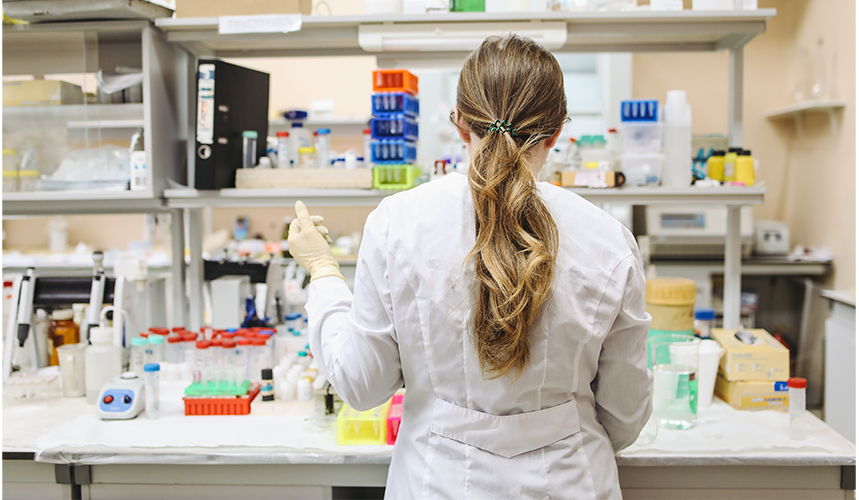
CBD’s legal status is similar to that of a dietary supplement, meaning that it isn’t regulated by the FDA like other food and drugs. This can make the world of CBD products feel like the Wild West.
From a consumer standpoint, this means it’s essential you know everything about the products you buy before you trust a company with your health—that’s where we come in.
We are constantly working to provide consumers with the most thorough and accurate information about brands that advertise CBD products. We only review and support products that provide public test results for their products related to safety, purity, and CBD content. We hope they help you find the best product for your journey to natural health!
Conclusion: Six Reasons You Should Try CBD
1. CBD is Naturally Occurring In Your Body
You and every other mammal are equipped with an endocannabinoid system whose sole purpose is to maintain equilibrium, or homeostasis, in the body. CBD nourishes this system.
2. CBD Boosts Your Overall Health
Because these molecules are already produced by your body, what you’re really doing is bolstering the total amount. This increase gives your body the tools to clean, repair, improve, and strengthen all of your physiological systems.
3. Daily Use Is Beneficial Whether You’re Healthy or Sick
A daily CBD regimen will deliver exponential benefits as compared to sporadic or occasional usage. If you need help choosing the best type of CBD for you, check out our CBD Consumption Guide that covers different salves and tinctures.
4. You Don’t Need a Doctor or Medical Card
You do not need a medical card to purchase CBD. While you will be able to get very high-quality CBD products from medical dispensaries in legal states, it’s also completely possible to purchase CBD online without specific medical reasoning.
5. CBD Is Available Online
As long as the product has been extracted from the correct starting material, CBD is legal to buy online. We’ve written various articles on the legal difference between cannabis oil and hemp oil as well as the rules for buying CBD online.
6. CBD Oil is Legal in All 50 states
The DEA finally relented and admitted that both possession and consumption of CBD oil is legal. Thank goodness! Take comfort in the fact that you are not breaking the law: under the 2018 Farm Bill, hemp is defined as a fully legal agricultural commodity entirely separate from its intoxicating cousin, marijuana.
